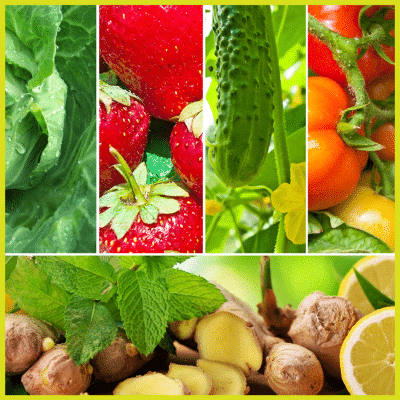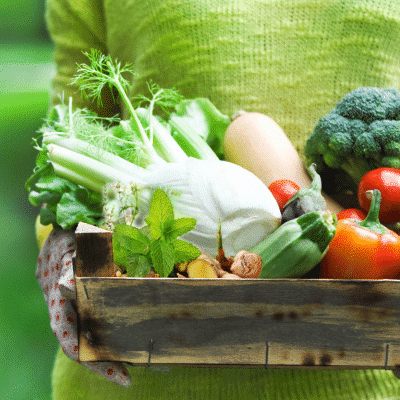Garden Your Way to a Better Gut: The Best Plants to Promote Gut Health
 Did you know that planting a garden could be the best way to improve your gut health naturally? Well if you didn’t before, now you do and we’ve got quite a few reasons why! With spring right around the corner, we wanted to let you know exactly how you can garden your way to better gut health.
Did you know that planting a garden could be the best way to improve your gut health naturally? Well if you didn’t before, now you do and we’ve got quite a few reasons why! With spring right around the corner, we wanted to let you know exactly how you can garden your way to better gut health.
How Gardening Can Be Good for Your Gut Health
Gardening is great for so many reasons! It gets you outside, you know exactly what’s going into your food, and honestly, it’s pretty relaxing once you know what you’re doing!
With all of these awesome (and more obvious) benefits, you may still have not gotten into gardening for one reason or another. Here are some science-backed reasons to get into gardening:
- Gardening improves mental health even in cases of severe depression or self-harm.
- Getting your hands dirty actually improves your gut microbiome because you’re being exposed to more microbes — giving your gut a higher microbial diversity (which is a very good thing)
- Sunlight is our primary source of Vitamin D. Healthy Vitamin D levels improve the balance of microbes in our gut by inhibiting the bad and supplementing the good. It also shows a huge impact on autoimmune diseases and allergies.
- Studies show that gardening with your children makes them eat more fruits and vegetables. They become more interested in eating them because they had a hand in growing them.
- You limit your exposure to antibiotics and pesticides that are often used in agricultural practices. These dangerous chemicals have been linked to many health conditions and by growing your own you can take measures to use more natural options against insects.
So now that you know the benefits of gardening — particularly for your gut health — let’s get into what kind of plants you can be included in your garden that directly affect your gut health.
The Best Foods for Gut Health to Plant in Your Garden this Spring
You can plant all sorts of fruits and veggies in your garden but here are our top suggestions to set you up for a healthy gut.
Tomatoes
Tomatoes are one of the best plants to start growing. They’re great if you have a full-blown garden or if you’re in a small apartment. Tomatoes offer your body tons of nutrients and help your gut to repair itself.
Studies found that eating tomatoes help to strengthen your intestinal barrier thereby reducing systemic inflammation and disease.
Growing tips for tomatoes:
- They don’t need to be watered daily
- Support growing branches so they don’t snap (Check out tomato cages)
- Plant the seeds deeply so there is enough root for them to grow strong
Cucumbers
Cucumbers are fantastic to have in your garden. They’re versatile plants that can be used for topical treatments to improve your skin and eye health and can be used in different ways for meals.
Cucumbers reduce inflammation inside and outside of your body. They also have high levels of fisetin, a polyphenol that helps fight and prevent many diseases like cancer, obesity, and cardiovascular disease.
You can also get homemade probiotics by making pickles with your cucumbers at home. Take pickling cucumbers from your garden, put them in a mason jar with water, salt, garlic cloves, dill (another great thing to grow in your garden to improve gastrointestinal health and disease), and whatever other flavorings you want. Let them sit in the jar for a few days to ferment and voila you have probiotic-filled pickles!
Growing tips for cucumbers:
- Know what type you’re growing and its specific requirements (sun vs shade, watering, etc)
- Harvest them often (they’ll give you a lot of fruit if you do this)
- Keep them warm
Cabbage
Cabbage is a great plant to have in your garden. Cabbage is full of fiber and prebiotics to help your gut stay healthy. You can roast or grill it or add it to salads and stir fry. You can also ferment cabbage for sauerkraut and other dishes to add a nice sour twist filled with probiotics.
Cabbage growing tips:
- They like moderate temperatures and don’t do well with frost or extreme heat
- Even though it likes moderate temperatures, cabbage needs full sunlight to grow well
- Plant near onions or radishes to keep away pests that feed on them
Ginger
Ginger is a well-known home remedy for tummy troubles. It’s a surprisingly easy plant to grow at home, as well! Ginger goes great in many dishes like stir fry, soups, and teas. Ginger helps to alleviate nausea and vomiting while helping to improve constipation.
Tips for growing ginger:
- Ginger is a tropical plant so it likes warmth, humidity, and moist soil
- Know that it can take 8-10 months for your ginger plant to be ready to harvest
- If you live somewhere cold, start your ginger indoors

Mint
Mint is a wonderful plant to have in your garden. It not only offers you a ton of health benefits but it’s also a great companion plant to fend off predators that want to eat your crop.
Mint is a crucial part of why Atrantil works so effectively to improve gut health. Mint has a calming effect on your gut and helps to reduce inflammation all throughout your body which improves health and lessens the risk of disease.
Growing tips for mint:
- Mint plants like a part shade/part sun area to grow
- Give them enough space to grow as mint plants can grow quite large if given the space (12-24 inches)
- Mint can easily be grown in pots
Berries
Berries are fantastic fruits to have. They are full of polyphenols that help to support your health and they’re quite easy to grow! Strawberries and blueberries can grow with not much space required. Berries are great as they are, in pies, or even in water to give it an extra refreshing flavor.
Tips for growing berries:
- Berries LOVE the sunshine so make sure they get a lot of it
- Mulch will be your best friend to avoid your berry crops from being attacked by weeds
- Water them well but not too much
There are so many plants you can opt for in your garden this spring and ultimately you can’t go wrong with any of them. The biggest tip we can give you is to enjoy the experience. There is a lot of information to learn about gardening which can feel overwhelming. But if you take the time to learn to do it the right way, you’ll have a much more relaxing time and you’ll have a new hobby that helps your brain and body year after year.
What is your favorite plant to grow? Let us know in the comments below!
https://pubmed.ncbi.nlm.nih.gov/30827159/
https://www.ncbi.nlm.nih.gov/pmc/articles/PMC6985452/
https://pubmed.ncbi.nlm.nih.gov/27964852/
https://www.ncbi.nlm.nih.gov/pmc/articles/PMC3108117/#__sec4title
https://pubmed.ncbi.nlm.nih.gov/29326940/
https://pubmed.ncbi.nlm.nih.gov/27671819/
https://www.ncbi.nlm.nih.gov/pmc/articles/PMC5088306/
https://www.ncbi.nlm.nih.gov/pmc/articles/PMC4818021/#__sec7title
https://pubmed.ncbi.nlm.nih.gov/18403946/
https://pubmed.ncbi.nlm.nih.gov/30737441/
https://pubmed.ncbi.nlm.nih.gov/31174376/
https://pubmed.ncbi.nlm.nih.gov/31757061/